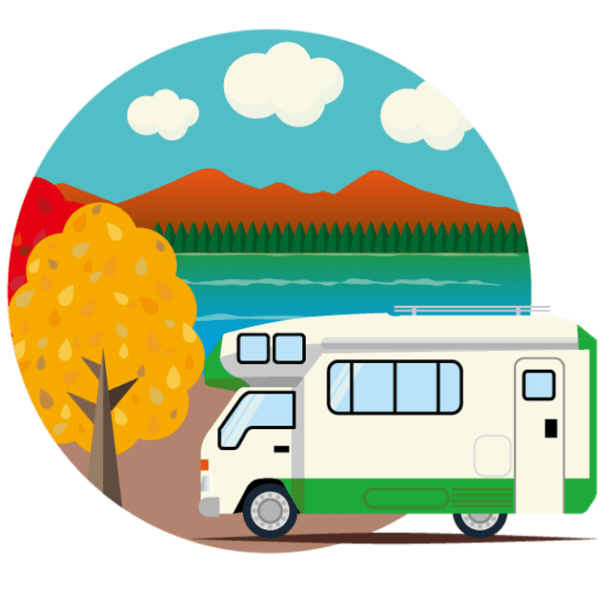Various reasons increase the demand for mobile homes, to live in a camper van or RV. One reason is that they provide an opportunity for exploration and novelty that one would not find in a more conventional living situation. If you have a camper van or RV, you can go anywhere, whenever you want, and never have to worry about where to sleep. On top of that, camper vans and RVs save money in the long and short term compared to conventional housing options. They also allow residents to live a simpler, more basic lifestyle with minimum space.

The camper vans and recreational vehicles are eco-friendly since they have lesser carbon footprints and can be powered by renewable energy sources like solar. In recent years, camper vans and RVs have become more common as affordable alternatives.
The ins and outs of life in a camper van or RV are discussed in detail here. We’ll also learn how to live in a camper van or RV for your family’s requirements, discuss the legal and safety issues, explain how to make ends meet when travelling in a camper van, and give resources for additional research and share advice and suggestions.
Choosing the Right Camper Van or RV
Picking up a suitable camper van or RV is the first step towards nomadic life. Here are a few things to remember when you choose to live in a camper van or RV:
Consider Your Budget
The cost of a camper van or recreational vehicle may start at a few thousand dollars and go far into the hundreds of thousands. When you start planning to live in a camper van or RV, you should figure out what your budget is and what characteristics you are in need of.
Size Selection
RVs and camper vans range from small vans to larger motorhomes. Consider whether you’ll be going alone or with a group and how much room you require.
Layout Inspection
When planning to live in a camper van or RV, keeping the camper van’s or RV’s layout in mind is necessary. Specific floor plans are better suited for solo travellers, while others may easily accommodate many people staying together, such as a spouse or a family. Don’t forget to evaluate the available beds, kitchens, and bath options.

Check the Facilities
Look for conveniences like a fridge, stove, air conditioning, heating, and bathrooms that suit your demands. A television, stereo system, and a generator are standard in certain camper vans and RVs.
Its Particular Condition
Inspect the vehicle thoroughly, mainly if it is an old camper van or recreational vehicle. Look around for any deterioration, water damage, or structural problems. If you are doubtful, ask an expert to have a look.
Necessary Repairs and Measures
When purchasing one, be sure you can get parts and servicing for the type you’re interested in. You should know how much time and money will be needed for regular maintenance to live in a camper van or RV.
The Importance of Considering Your Lifestyle and Needs
Evaluating your current way of life and plans is important before making a camper van your permanent residence. As the RV you choose will serve as your primary residence while on the road, ensuring it suits your needs is vital. You should think about how much room you’ll need to live in a camper van or RV, where you’ll sleep, how you’ll cook, how you’ll bathe, and how easily you’ll be able to get about.

If you’re hitting the road by yourself, a compact camper van could do the trick, but bringing the kids and the dog along might need something more substantial. A camper van or RV with a bedroom is a good choice if you value your solitude, and a recreational vehicle with a kitchen is a better pick if you love cooking on the road. It is a convenient home away from home if you choose one that satisfies your requirements.
Setting Up Your Camper Van for Living
The first step to live in a camper van or RV a pleasant and practical home on the road, is to set it up for a living. Some pointers to get you going are as follows:
Necessary Steps
- The arrangement of spaces, storage rooms, and furniture as you plan the best layout for your living area, taking into account how you live and the requirements of your home.
- The optimal design of your home will depend on your preferences and how you want to live in a camper van or RV. Think about where you want to put couches, beds, and cabinets.
- Shelving, cupboards, and drawers significantly improve your storage. You want to look into modular storage solutions to make the most.
- Make sure the furniture you choose suits the area and your requirements. Things like a bed, table, chairs, and storage options should all be assessed.
- Make the most efficient use of your space by arranging your things to make everything easily accessible when you live in a camper van or RV.
- Use containers for storage and baskets to maintain a neat environment.
- To create an atmosphere that is more reminiscent of your own house in your living area, customize it with elements like artwork, carpets, and drapes.

Recommendations for Decorating and Making the Space Feel Like Home
- Furnish your living room with textiles like blankets, toss cushions, and curtains to make it more inviting. You should choose fabrics that show off your individuality and live in a camper van or RV.
- One can infuse their living area with more personality and make it seem like home by hanging artwork or pictures on the walls.
- Adding plants may provide a sense of vitality and vibrancy. Select plants that neither need a lot of attention nor demand a lot of direct sunlight.
- The lighting should be gentle and warm to evoke a feeling of cosiness. You better give a thought to installing a combination of overhead and task lighting in your living room to make it more valuable and pleasant.
- To live in a camper van or RV you may make your living area seem more like your own by bringing in personal objects (books, memories, and accessories you like using).
- One should choose a colour palette that displays their tastes and style. If you want to add depth and interest to your living area, incorporate various hues and patterns into your decor.
Legal and Safety Considerations
Living in a camper van or RV requires careful attention to the law and your safety. Here are a few things to remember if you want to live in a camper van or RV and hit the road legally:
Recommendations for Camping and Driving Safety
- Parking in restricted locations, especially for extended periods, is strictly banned and must be avoided at all costs.
- When parking your camper van or recreational vehicle, ensure you know your area’s rules.
- When you live in a camper van or RV, check the condition and fix any problems. Practicing safe driving habits like fastening seatbelts and keeping your mind on the road is also important.
- Ensure you and your belongings are protected by securing doors and windows and being alert when camping.
- Raw sewage, grey water, and black water should all be disposed of properly. Don’t dump trash just anywhere; choose a proper landfill instead.
- Having the right kind of insurance for your RV is necessary. You should protect yourself and your belongings with liability, collision, and comprehensive insurance.
- You may need permission or a license to park or camp in a particular region. Find out what permissions or support are required in your area and get them if they are.

Budgeting for Life in a Camper Van or RV
It’s significant to think about your budget before hitting the road, but it surrey be a cheap way to see the world!
The cost of the car itself will be a major outlay of money. There is a significant range in price for camper vans and recreational vehicles due to factors such as age, size, and condition. Before making a purchase, research and figures out how much you can afford to spend. The initial cost isn’t the only cost; gasoline, maintenance, and camping fees increase over time. The petrol price will change depending on your car’s size and fuel efficiency, and the cost of repairs will change as the vehicle ages and wears out. Maintaining your camper van or recreational vehicle can keep running smoothly when you live in a camper van or RV and save you big on costly repairs.

Camping fees are standard and may vary significantly from one campsite to another based on location and facilities provided. Finding the most cost-effective campsite requires digging since some offer extended stays or membership discounts. Ultimately, living in a camper van or RV is a cheap way to see and escape the world, but planning and including all the costs is essential.
Finding Campgrounds and Parking Spots
Finding a safe and secure overnight parking spot is much needed to live in a camper van or RV. Campgrounds and parking sites are found in various locations:
Public Parks
Several public parks provide camping services, from rudimentary tent sites to RV connections. These parks to live in a camper van or RV are a low-cost alternative with facilities like walking paths, beaches, and other outdoor pursuits.
Private Campgrounds
Private campsites charge more than public parks but often provide more services. It is such as RV hookups, hot showers, and laundry rooms are available at most private campsites.

Boondocking Sites
Boondocking is camping in a remote area without using services or facilities. It may be a better option for someone seeking a more daring experience, allowing them to explore less visited areas.
Rest Areas
There are plenty of places to park a camper van or recreational vehicle overnight along motorways. You will find few comforts at these locations, but they might be helpful as a place to rest during long car rides.
Pros and Cons of Living in a Camper Van or RV
When you live in a camper van or RV have advantages, it also comes with its fair share of difficulties.
Pros
- Your mobile home allows you to go anywhere, anytime. You won’t have to worry about finding a place to stay in unfamiliar cities, so you may visit as often and for as long as you desire.
- It’s possible to save by eschewing conventional accommodation in favor of a mobile home or RV. You can reduce your monthly rent or mortgage payment and food bill by preparing your meals at home rather than dining out.
- The constraints of a tiny dwelling might inspire an approach to minimalism by forcing its residents to pare down to the bare minimum. Living with more purpose and meaning is possible!
- Live in a camper van or RV allow you to spend more time outside and deepen your connection to nature.
- With a mobile home, you easily adjust your itinerary. Whether the weather or other unforeseen circumstances call for a change in plans, rearranging your lodging plans is not a problem.

Cons
- It’s important to be inventive regarding storage and organizing when living in a limited place.
- Finding a place to retreat and relax might be difficult as well.
- Camper vans or RVs need frequent maintenance to run properly. Oil changes, tyre rotations, and cleaning are examples.
- Road life is seldom predictable; you never know when anything may break or need fixing. Being constantly on the move makes it hard to feel rooted in any place or develop meaningful relationships with others.
- Keeping your camper van or RV at a comfortable temperature might be challenging, depending on the weather outside. Severe weather, whether hot or cold, disrupts daily life.
- It’s possible that living in a camper van or recreational vehicle violates local ordinances, depending on where you park. If you don’t want to get in trouble with the law or face penalties, you should learn and abide by the local legislation.
Conclusion
Weigh the benefits, drawbacks, and financial and legal implications to live in a camper van or RV. Doing your homework and organizing yourself before adopting this way of life is necessary. Several websites, blogs, and social media groups cater to those considering making their home in a camper van or recreational vehicle. Joining such groups and picking the brains of seasoned nomads is a great way to get the most out of a new way of life.







